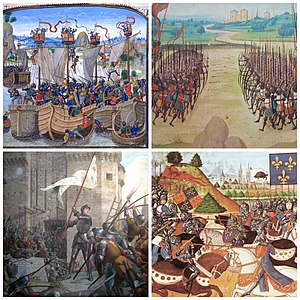Hundred Years' War
| Hundred Years' War | |||||||||
|---|---|---|---|---|---|---|---|---|---|
 Clockwise, from top left: The Battle of La Rochelle, The Battle of Agincourt, The Battle of Patay, Joan of Arc at the Siege of Orléans |
|||||||||
|
|||||||||
| Belligerents | |||||||||
French victory
The Valois retained the throne of France
The Hundred Years' War was a series of conflicts waged from 1337 to 1453 by the House of Plantagenet, rulers of the Kingdom of England, against the House of Valois, rulers of the Kingdom of France, over the succession of the French throne. Each side drew many allies into the war. It was one of the most notable conflicts of the Middle Ages, in which five generations of kings from two rival dynasties fought for the throne of the largest kingdom in Western Europe. The war marked both the height of chivalry and its subsequent decline, and the development of strong national identities in both countries.
After the Norman Conquest, the kings of England were vassals of the kings of France for their possessions in France. The French kings had endeavored, over the centuries, to reduce these possessions, to the effect that only Gascony was left to the English. The confiscation or threat of confiscating this duchy had been part of French policy to check the growth of English power, particularly whenever the English were at war with the Kingdom of Scotland, an ally of France.
Through his mother, Isabella of France, Edward III of England was the grandson of Philip IV of France and nephew of Charles IV of France, the last king of the senior line of the House of Capet. In 1316, a principle was established denying women succession to the French throne. When Charles IV died in 1328, Isabella, unable to claim the French throne for herself, claimed it for her son. The French rejected the claim, maintaining that Isabella could not transmit a right that she did not possess. For about nine years (1328–1337), the English had accepted the Valois succession to the French throne, but the interference of the French king, Philip VI, in Edward III's war against Scotland permitted Edward III to reassert his claim to the French throne. Several overwhelming English victories in the war—especially at Crecy, Poitiers, and Agincourt—raised the prospects of an ultimate English triumph. However, the greater resources of the French monarchy precluded a complete conquest. Starting in 1429, decisive French victories at Patay, Formigny, and Castillon concluded the war in favour of France, with England permanently losing most of its major possessions on the continent.
...
Wikipedia
